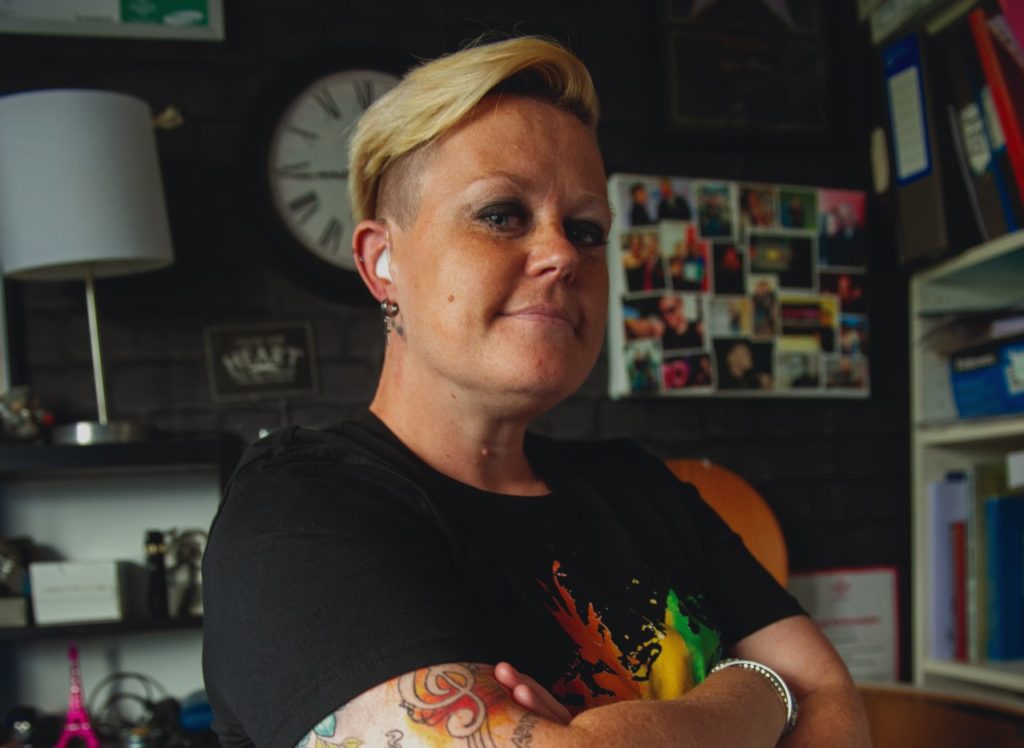Fletch@ is one of the UK’s leading Deaf SignSong performers. Otherwise known as Jayne Fletcher-Brander, the 36-year-old from Wolverhampton explains how music has kept her going “through her darkest days”.

It wasn’t until senior school that I realised I was deaf
I was born prematurely. The nerves in my ears hadn’t developed correctly, which meant I was profoundly deaf.
My family were all hearing with no experience of Deaf culture, identity or the language. My parents believed that I would ‘get by’ in the normal hearing world. I was 7 when I switched to a school which had a deaf base and first introduced to British Sign Language (BSL).
I learnt to sign and used it to communicate at school with friends – but I wasn’t allowed to sign at home. In fact, it wasn’t until senior school that I realised I was deaf – I thought my hearing aids, radio aids and using sign was ‘normal’. I was so confused when I was bullied for being deaf.
I realise my parents had been in total denial; for instance, they would refer to my deaf friend, who couldn’t talk or hear anything at all, saying: “your friend is deaf, you are not – you can hear, you can talk!”.
How I learnt my first song
Aged 9, I was at home when I heard a female voice singing. I asked my mum what the noise was and she pointed at the stereo. I didn’t understand what she meant. She showed me a CD case – it was Celine Dion – pulled out the lyrics card and tried to explain what singing was, using her finger to follow the words while mouthing the lyrics. I was lipreading my mum, following the words, and trying to hear the music – and I just thought, wow!
It’s strange to remember my mum encouraging me to sign to it, considering her viewpoint on my deafness and use of BSL. But, thanks to my mum, that moment was the start of my passion for music.
Watching MTV after that, seeing all the different bands excited me. I wanted to be a famous pop artist with a twist – I was going to sign, not sing. I thought it was a unique idea because I’d never had a deaf role model to follow.
People learning to sign would be a massive help
It is so much more difficult for a deaf person to accomplish something than for a hearing person. We have communication barriers to overcome and face prejudice because we are a minority. People lack awareness of deafness and deaf issues.
If children were introduced to BSL in school instead of French or German, for instance, it would be so much easier for deaf people to communicate – and the mental health of deaf people would improve.
I struggled for years with mental health issues such as anxiety, depression, self-harm and suicidal impulses. I feel they’re all caused by barriers around communication – so few people around me signed and I could only express myself through music.
I had extremely low self-esteem and confidence and I hid myself away, learning lyrics to songs and translating them into sign language. This is what I owe my life to – through my darkest days, the music kept me going.
Video: Fletch@ signs ‘Perfect to Me’

My advice has always been “never give up on your dream”
If people say ‘you can’t do it, you’re deaf’, find a way and prove them wrong.
To get where I am today has been both exhilarating and challenging. Hearing performers have the privilege of already knowing the meaning of the words. BSL is my first language and I have to learn what the lyrics mean in English before I can translate them in BSL.
The music has beats that hearing people can use to time their performance; I have to rely on a combination of counting and visual cues from an interpreter. An interpreter is an integral part of my work. I have to teach them my translation and what parts of the music I can and can’t hear so they can support me when I’m on stage.
If I don’t provide my own interpreter, I rely on the organisers to book one and this takes a little more planning. Subsequently I lose bookings if it’s seen as ‘too much hassle’.
The acoustic environment is very challenging for deaf people, too. My soundcheck takes longer than a hearing person’s.
I love performing and signing songs because, for me, it’s a powerful tool to express my inner feelings and past experiences. After a performance, I feel better in myself because I’ve got rid of everything that was bothering me.
I get such a buzz seeing the reactions of my audience
Depending on the song, they could be in floods of tears or cheering and screaming. I love opening up people’s minds to the Deaf world and the beauty of our language.
There can be criticism, too, of course, which naturally every performer gets because you’re baring all to your audience. The hardest thing for me is receiving abusive and derogatory comments. But I always get up, get stronger every day, and carry on being fabulous Fletch@.
Music is my life – and no one will ever take that away from me.
To learn more about Fletch@ or to join her signing choir, visit Fletch@’s website.